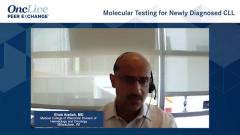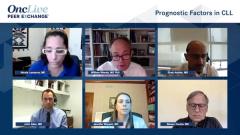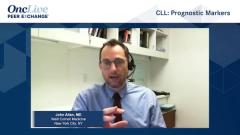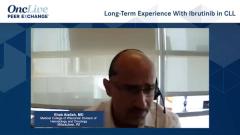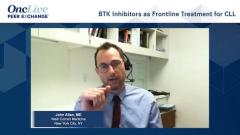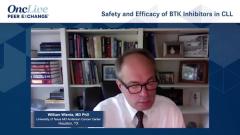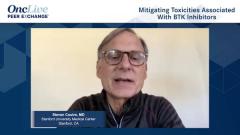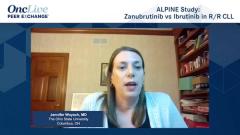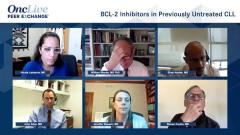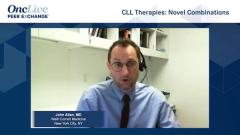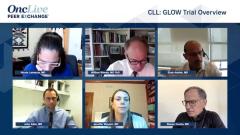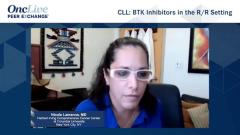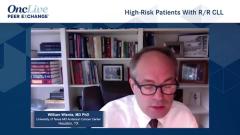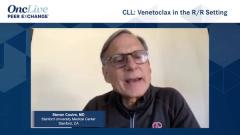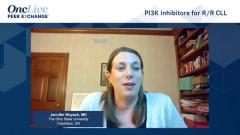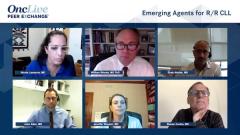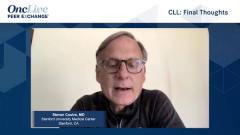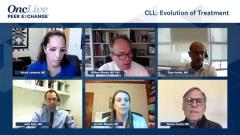
BCL2 Inhibitors in Previously Untreated CLL
Experts discuss the optimal approach for choosing between a Bruton tyrosine kinase (BTK) inhibitor–based therapy vs a BCL2 inhibitor–based regimen for frontline chronic lymphocytic leukemia (CLL) therapy.
Episodes in this series

William Wierda, MD, PhD: Let’s move on to BCL2 inhibitor-based therapy and the CLL14 data that have been updated and reported at the recent meetings, particularly EHA [European Hematology Association Congress], by the German CLL [chronic lymphocytic leukemia] study group. Ehab, maybe you can give your perspective on the updated CLL14 data and the other pathway we can take in terms of first-line fixed-duration treatment with BCL2 inhibitor–based therapy. Who are the patients you think are ideal for that strategy? Then we’ll go over that with the others.
Ehab Atallah, MD: It’s a little similar to who would be eligible for ibrutinib. I would definitely consider obinutuzumab-venetoclax first line for patients who don’t have a 17p deletion or a TP53, mainly because of the time-limited therapy. Time-limited therapy is very convenient for patients. They do pay a higher price in terms of having some adverse effects earlier on and having to come in for the monitoring, especially with the venetoclax. I usually give this regimen like the paper, where we start out with obinutuzumab and then add the venetoclax on day 22. Most patients are significantly cytoreduced by that point, and then I start the venetoclax after that. Rarely have I needed to admit a patient after I started with obinutuzumab up front. It’s time limited. The update that was presented showed that after giving this treatment for 12 months, 60% or 70% of patients remained progression-free at 3 years, and the median was not reached. Those are very encouraging results with time-limited therapy.
William Wierda, MD, PhD: You mentioned 17p deletion. One of the interesting things about that update was the progression-free survival curve they presented for the 17p deletion group. Who would like to comment on fixed-duration BCL2 inhibitor–based therapy, particularly in 17p deletion, and what the expectations are in comparison with continuous treatment with BTK inhibitor–based therapy? Do you have a preference?
Steven Coutre, MD: Bill, I can say a few words. It’s reflected in our NCCN [National Comprehensive Cancer Network] Guidelines as well. For up-front treatment, the preferred drugs are continuous BTK inhibitors. That’s at least based on the early observation in CLL14 that the progression-free survival is shorter: about 50% with 4 years of follow-up. The expectation for somebody with TP53 disruption is about a 4-year benefit from the treatment. For some people, that may be fine, but for others, staying away from BTK inhibitors is probably more attractive. In general, at least right now, many of us are not comfortable with time-limited therapy in that patient group.
William Wierda, MD, PhD: Does anybody else have a differing opinion or approach? For first-line therapy, BTK inhibitor, we’re all pretty much on the same page with continuous management rather than giving them a fixed-duration treatment with the data we currently have. What about mutated vs unmutated with fixed-duration BCL2 inhibitor–based therapy? Does anybody want to comment on that? Jennifer?
Jennifer Woyach, MD: We’ve seen some separation of the curves in terms of progression-free survival with venetoclax-obinutuzumab being a little shorter for patients with unmutated IGVH. This is something that will have to be followed more long term with this study, but we don’t see that with the continuous BTK inhibitors. Whether that’s a function of how long people are taking them vs the agents themselves, it’s hard to say. At this time, I lean a little more toward BTK inhibitors for the unmutated IGHV, but not enough that I would strongly recommend it if a patient really wanted fixed-duration therapy.
TRANSCRIPT EDITED FOR CLARITY


